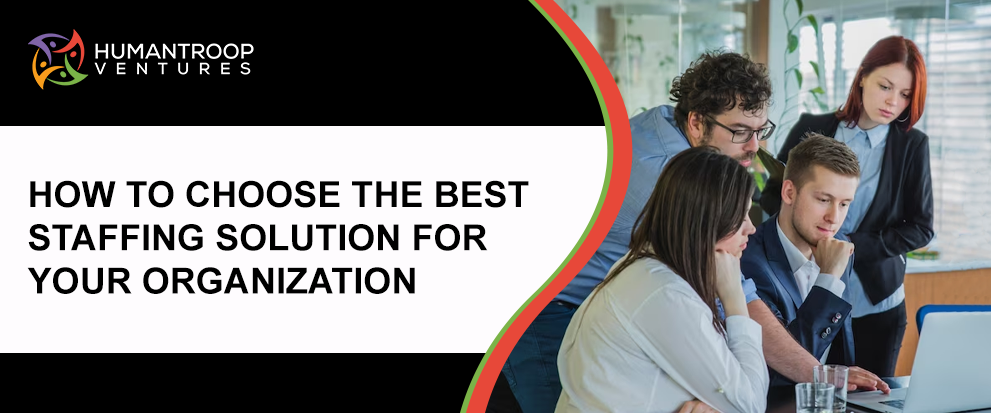
How to Choose the Best Staffing Solution for Your Organization
As a Business owner, one of the most crucial decisions you’ll make is selecting the right Staffing Solution for your Organization. The success of your business heavily relies on having a competent and dedicated team. It can be difficult, however, to find the perfect fit. With the multitude of options available, it’s important to carefully consider your needs and make an informed decision. In this article, we will guide you through the process of selecting the ideal Staffing Solution for your Organization.
Here are some steps to help you choose the right Staffing Solution for your Organization
1. Assess Your Needs
Before diving into the search for a Staffing Solution, it’s essential to assess your specific needs. Take a closer look at your Business goals, long-term plans, and the skills required to achieve them. Identify any skill gaps within your existing team and determine the type of professionals you need to fill those gaps. This assessment will serve as a foundation for selecting the right Staffing Services.
2. Understand Different Staffing Solution Options
There are various Staffing Solution options available, each with its own advantages and disadvantages. Let’s take a closer look at the two primary options: permanent hires and temporary Staffing.
Permanent Hires:
Permanent hires involve recruiting full-time employees to become a part of your organization on a long-term basis. This option provides stability, loyalty, and a deep understanding of your Company’s culture. However, it comes with higher costs and longer Recruitment processes.
Temporary Staffing:
Temporary Staffing involves hiring professionals for a specific duration or project. This option offers flexibility, cost-effectiveness, and access to specialized skills. However, it may lack long-term commitment and familiarity with your Company’s processes.
3. Consider the Pros and Cons
After understanding the different Staffing options, it’s important to weigh the pros and cons based on your specific needs.
Permanent hires provide a sense of stability and commitment. They are ideal for roles that require deep knowledge of your Business and long-term dedication. However, the Recruitment process can be time-consuming and expensive, and there may be limited flexibility if the Business needs to change.
Temporary Staffing offers flexibility, scalability, and cost-effectiveness. It’s suitable for short-term projects, seasonal work, or when you need specialized skills for a specific duration. However, there may be a learning curve for temporary staff to adapt to your Company’s culture and processes.
4. Research Staffing Agencies
If you decide to go with a Staffing agency, thorough research is crucial. Consider agencies that specialize in your industry as well as those that have a proven track record of success. Check their online reviews, testimonials, and case studies to gauge their reliability and success rate. Additionally, consider their candidate screening process, as it directly impacts the quality of professionals they provide.
5. Evaluate Costs
Cost is a significant factor in choosing a Staffing Solution. Calculate the overall expenses associated with each option, including Recruitment costs, onboarding expenses, benefits, and potential training requirements. It’s important to strike a balance between cost and quality to ensure long-term success.
6. Seek Recommendations
Reach out to your professional network for recommendations and insights. Talk to other Business owners who have used Staffing Services and learn from their experiences. Their firsthand knowledge can provide valuable guidance and save you from potential pitfalls.
7. Make a Well-Informed Decision
Based on your needs assessment, the pros and cons, research, and cost evaluation, you are now ready to make a well-informed decision. Whether you opt for permanent hires or temporary Staffing, remember that flexibility and adaptability are key in today’s ever-changing Business landscape.
Staffing Process:
Workforce Planning
The Staffing Process identifies how many people an organization requires to fill specific roles. Management considers many parameters to determine the exact number of people required to fill a position in an organization.
Recruitment and selection
A textbook definition of Recruitment and selection is “finding the right people at the right time”.. Staffing and Recruitment may have similar meanings, but Recruitment is a long-term process while hiring is a short-term process. While this is only one step in the Staffing process, HR has a broader scope.
Allocation and Acceptance
The Staffing Process involves assigning jobs to selected employees. Induction refers to the process by which a new employee is introduced or guided to a new job by an organization, ideally a senior employee or supervisor.
Training and Development
Staffing Process training involves imparting specific skills and knowledge regarding a set of employees and their jobs. When an employee joins an organization or innovation occurs, it is usually a one-time process. However, development is a continuous process aimed at increasing management capabilities.
Benefits of Staffing Solutions Services
Step 1: Streamlined Recruitment Process
One of the primary Benefits of Staffing Solutions services is their ability to streamline the Recruitment process. Staffing Solutions services simplify and streamline the Recruitment process. They have access to vast talent databases, allowing them to quickly identify and attract highly skilled candidates. This saves valuable time and resources for Businesses.
Step 2: Access to Qualified Candidates
A second Benefits of Staffing Solutions services is that Staffing agencies maintain a pool of prescreened and qualified candidates. They can efficiently match candidates’ qualifications with specific job requirements, ensuring Businesses have access to a diverse range of skilled professionals.
Step 3: Flexibility and Scalability
The third Benefits of Staffing Solutions services is that they are flexible and scalable. They can quickly provide temporary staff for short-term projects or permanent employees for critical positions, allowing companies to adjust their workforce size based on demand.
Step 4: Cost Savings
The fourth benefits of Staffing Solutions is reduced workloads and associated costs for HR departments. Staffing agencies also handle payroll, benefits, and compliance matters, further reducing administrative burdens.
Step 5: Industry Expertise
Staffing agencies possess expertise in talent acquisition and workforce management. They have industry insights, helping Businesses develop effective Recruitment strategies and navigate complex labor laws. This expertise enables companies to attract and retain top talent.
Step 6: Risk Mitigation
The last benefits of Staffing Solutions services is that they assume legal and compliance responsibilities for Businesses, reducing their risks. They stay updated with labor laws, tax regulations, and industry-specific requirements. Additionally, hiring temporary or contract employees reduces risks associated with long-term commitments.
Conclusion
Choosing the right Staffing Services for your Business is a critical decision that can greatly impact your Company’s success. By assessing your needs, understanding different Staffing options, considering the pros and cons, conducting thorough research, evaluating costs, and seeking recommendations, you will be able to make an informed decision. Keep in mind that selecting the ideal Staffing Services is an ongoing process, and adjustments may be needed as your Business evolves. So take your time, analyze your options, and build a team that will drive your Business to new heights.
FAQ’S
1. What is Manpower Staffing Services?
Manpower Staffing Services refer to the process of recruiting and providing temporary or permanent staff for Businesses in various industries. These services help Businesses efficiently meet their workforce requirements and fill employment gaps.
2. What industries can benefit from Manpower Staffing Services?
Almost every industry can benefit from Manpower Staffing Services. These services cater to a wide range of industries, including healthcare, IT, retail, hospitality, manufacturing, and more. The Staffing agency can provide staff with diverse skill sets to match the specific requirements of each industry.
3. How does a Recruitment Company work?
A Recruitment Company assists employers in finding suitable candidates for job vacancies. They typically advertise job openings, screen resumes and applications, interview candidates, and present the most qualified individuals to the client Company.
4. What is Process Staffing?
Process Staffing refers to the practice of recruiting, selecting, and hiring employees specifically to fill various positions within a specific organizational process or department.
5. What are the Benefits of process Staffing?
Process Staffing allows organizations to effectively match candidates’ skills and qualifications with the specific needs and requirements of their processes, resulting in enhanced efficiency, productivity, and overall performance.






